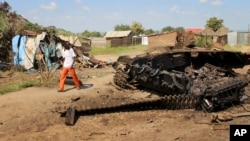A confidential U.N. report says South Sudan's deadly fighting in July was directed by the highest levels of government, and that leaders are intent on a military solution that has escalated the conflict from a "primarily political to tribal war."
The U.N. panel of experts report obtained by The Associated Press says President Salva Kiir and army chief of staff Paul Malong directed the fighting in the capital, Juba, that killed hundreds, using MI-24 helicopters that only they had the authority to deploy.
The report also says Kiir and Malong have focused on procuring new weapons and ammunition, including the apparent acquisition of two fighter jets. Two truckloads of ammunition were transferred from neighboring Uganda in June. The opposition has received limited arms from neighboring Sudan, the report says.
South Sudan's civilians are "bearing the brunt of the resulting harm" as weapons continue to be procured, the report says.
The U.N. Security Council has threatened to impose an arms embargo if South Sudan's government doesn't comply with a plan to deploy an extra 4,000 peacekeepers to protect civilians.
The report also says officials have focused on "mobilizing their respective tribes," which has worsened ethnic tensions. South Sudan's civil war began in December 2013 between supporters of Kiir, an ethnic Dinka, and former Vice President Riek Machar, an ethnic Nuer.
Tens of thousands of Nuer have taken shelter in U.N. camps in South Sudan under often dire conditions as a peace deal signed a year ago threatens to fall apart amid continued fighting.
The new report says the government and rebel's "arming of communities based on tribal affiliation continues to fuel widespread violence."
The report comes just days after the Security Council visited South Sudan to pressure the government to allow in the 4,000 additional peacekeepers. A joint statement by the council and the government said South Sudan accepted their deployment, but just after the diplomats left, government officials announced conditions including prior approval of troop contributors and what weapons they carry.
The visiting diplomats also pressed South Sudan's government to hold accountable soldiers who have been accused of rampaging through a hotel compound popular with foreigners in the July chaos, raping women, beating people and forcing everyone to watch a local journalist be shot dead.
The new report says 80 to 100 soldiers overran the Terrain compound and "raped and gang-raped at least five international aid workers and an unknown number of staff working at the compound, and executed John Gatluak, a Nuer employee of the NGO Internews in front of his colleagues in an ethnically targeted killing."
The report adds: "This attack was well coordinated and cannot be considered as an opportunistic act of violence and robbery."




